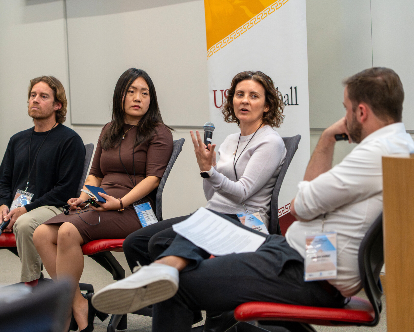
The research profile at the USC Marshall School of Business has increased tremendously over the last 20 years. One measure of Marshall’s advancing reputation is that a substantial number of faculty serve in editorial positions at the top journals in their disciplines. Currently, 11 faculty members representing the Leventhal School of Accounting and four Marshall departments are serving as journal editors or senior editors.
“These are particularly prestigious appointments for the individuals, but they’re also a reflection of the overall quality of the faculty that we have here at Marshall,” said Gareth James, deputy dean, E. Morgan Stanley Chair in Business Administration and professor of data sciences and operations.
The peer-review journal system is, James said, a fundamentally important part of academic research. “Without this editorial system, we have no basis for evaluating the quality of the research,” he said. “When you read something in a respected journal, it’s gone through a peer-review process, and the implication is that experts in the field believe that it’s high quality and meaningful research.”
Faculty who publish consequential research and hold editorial positions at high-impact journals not only boost the research reputation of the school, they also attract more top caliber researchers to USC Marshall.
“Marshall’s research reputation is very useful in helping our recruiting,” said Sha Yang, vice dean for faculty and academic affairs and Ernest Hahn Professor of Marketing. “Elite faculty help attract more elite people in the field, which in turn raises our profile.”
Rankings can also be indirectly impacted by a school’s research profile, James said. “Deans at other schools, if they know we have faculty with particular expertise serving in editorial positions, then they are going to think more highly of our school when they’re considering rankings.”
Editorial positions are considered a service contribution to the academic community and typically unpaid. But the work is invaluable because, as James noted, the whole system relies on journals. “Promotion cases and annual reviews are heavily dependent on journals,” he said. “If your paper is cited a lot, then that’s a suggestion that there’s something important in that work.”
Given the amount of work an editorship can entail, it is not uncommon to see more than one editor share the top position at a journal. That is the case for some of Marshall’s faculty, who not only share the role, but sometimes share it with Marshall colleagues.
“The fact that we currently have a number of faculty in various editorial roles,” James added, “says something good about Marshall.”
Meet the researchers: Questions and Answers with Regina Wittenberg Moerman and Anthony Dukes.




